Decaf coffee is coffee that’s had most or all of its caffeine removed using a special extraction process that removes caffeine molecules but preserves the molecules that give coffee its flavor and health benefits.
It’s great if you want to take advantage of the health benefits of coffee but want to keep your caffeine intake under control.
Decaf (short for “decaffeinated”) is good for drinking in the evening, and if you consume other supplements or beverages that contain caffeine, particularly if you are sensitive to the negative effects of caffeine, which can include nausea and jitteriness.
Want the health benefits of coffee without the buzz? We’ve ranked the best-tasting and highest-quality decaf coffee on the market.
Research
Rankings
1. No Fun Jo Decaf
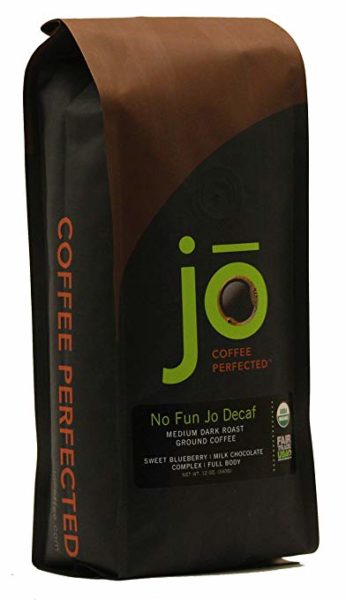
No Fun Jo Decaf is an excellent option for high-quality decaf coffee. This medium roast has many of the perks you’ll find in high-end specialty coffee that’s not decaffeinated, like 100% arabica beans, and organic and fair trade certifications. It’s pre-ground, so brewing a cup is a breeze.
2. Kicking Horse Coffee Decaf
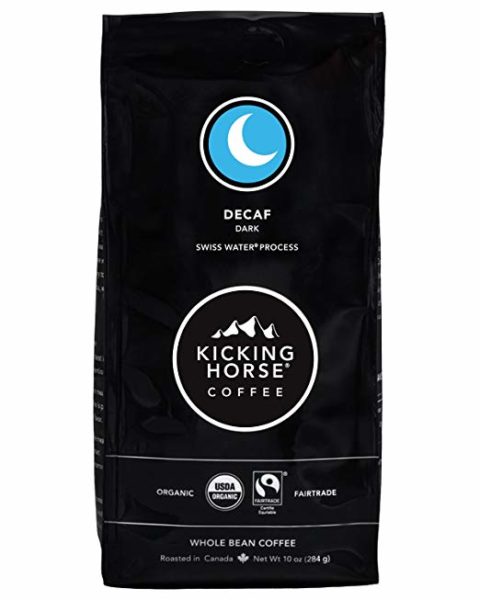
Kicking Horse Coffee makes a dark roast that’s decaffeinated via the Swiss water process, which means there are no chemical solvents involved in the caffeine removal process.
These roasted whole beans have a deep, rich, chocolate-like flavor, making it a favorite among those who like a strong dark roast.
3. Seattle’s Best Coffee Portside Blend
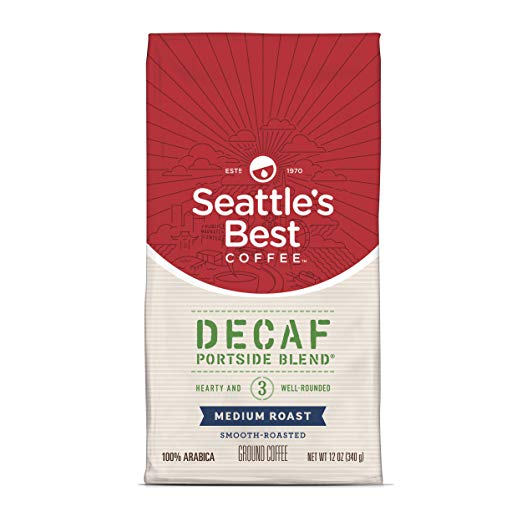
Seattle’s Best Coffee Portside Blend is great if you want a smooth, medium roast. This decaf coffee has a middle-of-the-road flavor profile that’s acceptable to just about everyone, so it’s a good go-to for a post-dinner coffee for guests.
Unlike more bold and distinctive flavors, it’s hard to offend anyone’s taste sensibilities with this coffee.
4. Cafe Don Pablo Colombian Decaf
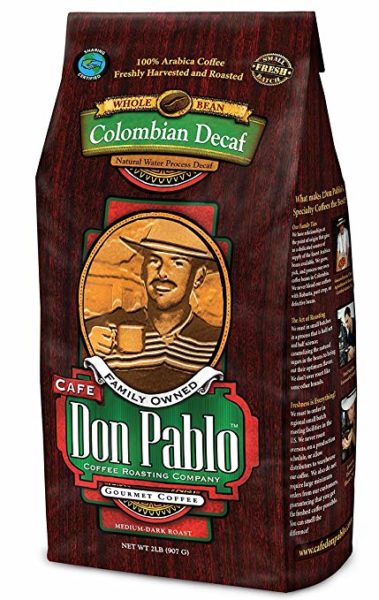
Cafe Don Pablo Colombian Decaf is a whole bean medium dark roast coffee that uses 100% arabica beans grown in Columbia.
The whole beans are great for making French press coffee, homemade espresso, or other preparations that call for non standard sizes of coffee grounds.
5. Jeremiah’s Pick Organic Decaf
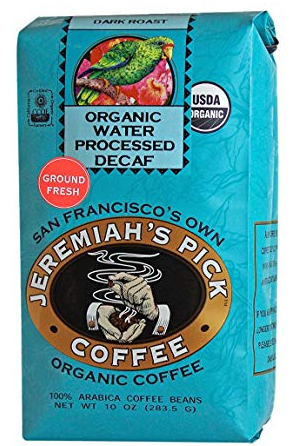
Jeremiah’s Pick Organic Decaf is certified organic and uses a solvent-free caffeine extraction process.
The beans are ground and ready to use, and make a dark brew with an earthy but smooth flavor profile. For a dark roast that’s organic and chemical solvent-free, Jeremiah’s Pick is the way to go.
6. Organic Coffee Co Gorilla Decaf
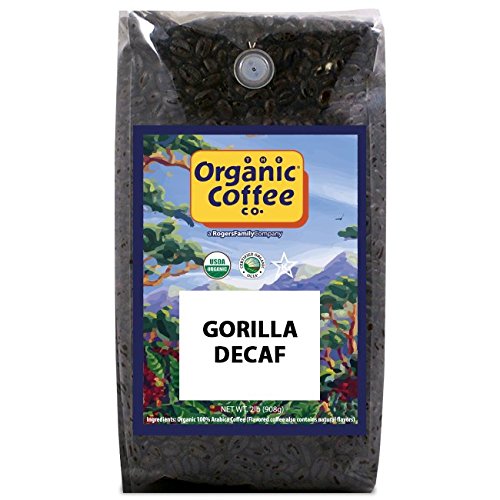
Organic Coffee Co Gorilla Decaf makes a small-batch whole bean decaf coffee that’s decaffeinated using the Swiss water process.
Its organic certification and solvent-free decaffeination process makes it a great choice if purity is important to you.
7. Green Mountain Coffee Roasters Breakfast Blend
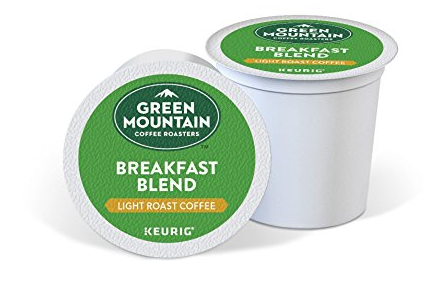
Green Mountain Coffee Roasters Breakfast Blend is the best option on the market if you want a decaf coffee that’s compatible with Keurig machines.
This bright and airy coffee is a light roast, unlike many of its competitors, and makes a fresh-flavored brew. Unless you prefer stronger and deeper roasts, look no further if you want a K-cup decaf coffee.
8. Medaglia D’oro Italian Roast Decaffeinated Espresso
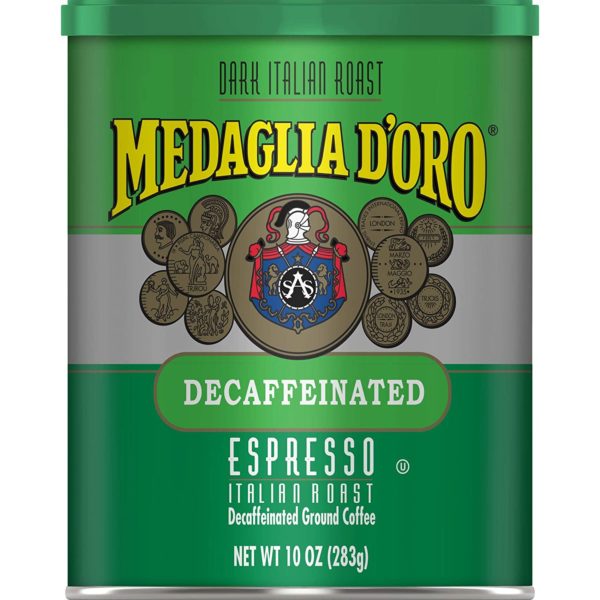
If what you need is a high-quality espresso that’s pre-ground and free of caffeine, Medaglia D’oro is the way to go. Using traditional Italian style espresso coffee, it’s our recommendation when it comes to making high quality espresso at home, without the caffeine content.
The only downside is that not everyone has an espresso maker at home, so it’s not quite as versatile as some of the other options in our rankings.
9. Starbucks Decaf Caffe Verona
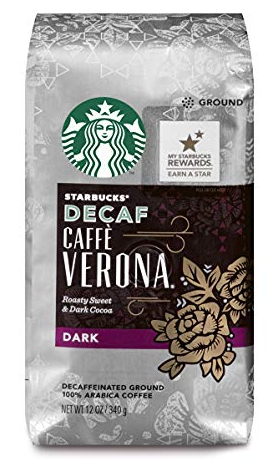
You can save yourself the trouble of stopping by a Starbucks for decaf coffee with Starbucks Decaf Caffe Verona.
It’s a dark roast coffee, and like other decaf coffees made by big brands, the flavor profile is nothing special, but you get a very consistent cup of coffee from batch to batch, and the taste profile is acceptable to people with many different palates.
10. Solimo Decaf Breakfast Blend
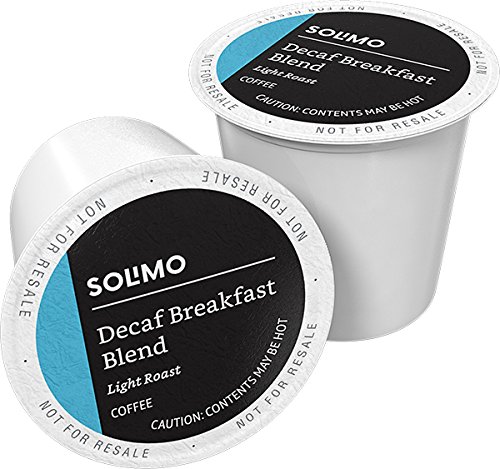
Amazon’s own Solimo brand makes a vacuum-packed single use cup for Keurig coffee machines. While it’s a niche use, if you need a lightning-fast cup of decaf coffee, this is a great option.
The flavor is brisk and smokey, so it you are looking for a strong and bold cup of coffee that’s easy to make with a K-cup machine, look no further than Solimo.
Category winners
Best decaf coffee overall: No Fun Jo Decaf
No Fun Jo makes a phenomenal medium roast that will go over well with anyone, whether you’re a regular decaf drinker or just like keeping some on hand for guests. Pre-ground, organic, and fair trade—across the board it’s a great choice.
Best decaf coffee for espresso: Medaglia D’oro Italian Roast
For traditional espresso without the caffeine, Medaglia D’oro is unbeatable. This pre-ground Italian-style espresso coffee tastes so good you’ll forget it’s decaf.
Best dark roast decaf coffee: Kicking Horse Coffee Decaf
For rich, smokey, earthy decaf coffee, Kicking Horse’s dark roast is our favorite. This organic dark roast is processed with the Swiss Water method, which leaves all of the richness of the dark roast intact.
Best medium roast decaf coffee: No Fun Jo Decaf
No Fun Jo’s medium roast blend is great tasting and approachable—it’s neither too light nor too dark, making it the perfect middle of the road pick. If you want a decaf coffee that will appeal to friends and family, there’s no better pick.
Best decaf coffee for Keurig coffee makers: Green Mountain Coffee Roasters Breakfast Blend
Need decaf in a rush? Green Mountain is our favorite when it comes to Keurig coffee machine coffee. These single serving K-pods are fast and easy to use, and sacrifice nothing on the taste. Plus, they’re recyclable!
Best whole bean decaf coffee: Don Pablo Colombian Decaf
Grinding your own coffee? Go for Don Pablo. This 100% Arabica coffee has a smooth taste and uses the Swiss water process, which keeps all of the essential flavors intact.
Who should buy decaf coffee?
Decaf coffee is great for most individuals and is especially beneficial for persons that want or need to avoid caffeine. Persons who suffer from high blood pressure, heart issues, or insomnia, will significantly benefit from choosing decaf coffee or regular coffee.
Decaf coffee can contain some chemicals and is not recommended for pregnant women or children unless otherwise directed by a medical professional.
How we ranked
One of the most important factors when choosing decaffeinated coffee is the distillation or decaffeination process. The direct solvent process uses a chemical like ethyl acetate to remove any caffeine. The indirect solvent process is added to the water rinsing the beans, which bonds and removes most of the caffeine. While both these processes are popular and practical, the use of chemicals deters us from making products using these methods our top picks.
The Swiss Water Method was our preferred choice and is why we ranked products like Kicking Horse so highly. The Swiss water method uses no chemicals and only uses pure water to gently remove the caffeine while preserving the flavor and nutrients. This process is certified organic by OCIA and certified kosher by the Kosher Overseers Association.
A newer method called coffee oil processing is worth noting as well. After beans have been immersed in hot water for a while, they are transferred into coffee oils that originate from coffee grounds. The oil helps to separate the caffeine from the bean, without sacrificing flavor.
Regarding the type of coffee, we preferred blends, like Seattle’s Best, over single bean origins. Coffee flavor can be dramatically affected by the decaffeination process, and using a blended coffee helps to mask the sourness and deficiencies.
Decaf coffee comes in a variety of forms, including pre-ground beans, whole beans, and K-cups. K-cups, like Solimo, ranked the lowest due to their impact on the environment and extra preservative content. We preferred whole beans over pre-ground because they tended to provide a better flavor, but it wasn’t a big concern since whole beans can be inconvenient if you don’t have an at-home grinder.
Lastly, we wanted all products to be certified organic to minimize any additional chemicals and pesticides.
Benefits
Decaf is the easiest way to get many of the benefits of coffee without the caffeine. Coffee is a popular beverage worldwide, and for those who want to avoid caffeine, decaf coffee is widely available.
While the stimulant qualities of caffeine are valued by many coffee drinkers, some people are sensitive to caffeine or have particular reasons for limiting it. Fortunately, pretty much all of the health benefits for regular coffee apply to decaf coffee as well.
Decaf coffee does not have the negative side effects of caffeine. Decaf has 97% or more of the caffeine removed—the exact amount depends on the specific process used. The processes to remove caffeine can involve organic solvents, water, or carbon dioxide. (1)
The decaffeination process is initiated before coffee beans have been roasted, and substances like solvents are removed before heat is applied; color, taste and smell variations can sometimes occur as a result of the treatment, often making it less bitter.
Coffee normally contains between 70 and 140 mg of caffeine per cup, depending on serving size and preparation methods. (2)
Decaf coffee may not be completely free of caffeine; one study found the amount in a cup ranged between 0 mg and 7 mg. (3)
Decaf coffee is rich in antioxidants. Coffee has been fingered as a poor nutritional choice in the past, but studies show it is a rich source of antioxidants, and in some cases, it may well be the main source for individuals eating a typical Western diet. (4)
The decaffeination process leads to the loss of some nutrients, so it can contain up to 15% less of the beneficial polyphenols and hydrocinnamic acids found in regular coffee. (5, 6)
These antioxidants reduce damage in the body resulting from the presence of free radicals; research shows antioxidants like those in coffee may help reduce the risk of developing a number of chronic diseases, including type 2 diabetes, cancer and heart disease. (7, 8)
In addition to the antioxidants, expect coffee to deliver small amounts of these nutrients as well: potassium, magnesium, sodium, calcium and phosphorus. (9) If you’re drinking several cups of coffee daily, even the low amounts can add up quickly.
Many studies into coffee consumption have found similar health benefits for regular coffee and decaf coffee. However, not all studies analyze decaf coffee separately, so it can be difficult to make a distinction between the two when it comes to nutrition.
In general, though, research supports the idea that most of the benefits of coffee have to do with the antioxidants and other complex chemicals in coffee, not merely its caffeine content (just like the benefits of green tea extract aren’t confined to its caffeine content either).
One caveat with research into coffee drinking is that most of it is observational in nature. This means any potential benefits cannot always be proven to result from drinking coffee, but instead, are only associated with the habit.
Decaf coffee can reduce your risk for type two diabetes and protect the function of your liver. Both decaf and regular coffee appear to reduce the chances of developing type 2 diabetes, one of the most prevalent health issues in the modern world. In fact, each cup you drink could cut your risk by up to 7%. (10, 11).
Moreover, Liver enzyme levels in coffee drinkers often run lower than in people who don’t drink coffee; this could provide a protective effect on liver function. (12)
Decaf coffee can help you live longer and think sharper. The statistical difference is small, but perhaps significant: premature death, as well as death resulting from heart disease and stroke, are lower in coffee drinkers than for those who don’t imbibe. (13)
Cognitive function usually declines as we age, yet drinkers of both decaf and regular coffee fare better in keeping mental processes sharp than those who don’t. (14)
Decaf appears to protect neurons in the brain, and could drop the risk of developing Alzheimer’s disease or Parkinson’s disease. (15, 16)
One study indicates the chlorogenic acid in coffee, which is present in both caffeinated and decaffeinated versions, may be responsible for this effect (17), while caffeine has been associated with a decreased risk of dementia. (18)
Decaf coffee can improve digestive health by cutting your risk for heartburn and reducing rates of colorectal cancer. Reflux or heartburn is a common problem for coffee drinkers, and studies show decaf clearly reduces the incidence of this painful and irritating issue. (19)
Downing two or more cups of decaf daily is linked with cutting the risk of developing colorectal cancer by nearly half. (20)
Side effects
While decaf coffee is free of the jitteriness and nausea that can come along with drinking regular coffee, the downsides of decaf are mostly related to benefits you won’t get that you would’ve gotten in regular coffee, as a result of its caffeine content.
Most people who drink coffee regularly appreciate the effects of caffeine, which include a reduction in fatigue and an increase in alertness.
Some of the benefits associated with coffee come directly from caffeine, so drinkers of decaf won’t be able to cash in on these effects. These include a boost to metabolism, better fat-burning, better memory and reaction time, improved athletic performance, metabolic boost and increased levels of fat-burning (21, 22, 23)
In view of the extensive research done with regular coffee as compared to studies with decaf, new information in regard to potential benefits of drinking decaf may surface in the future.
Recommended dosage
When it comes to drinking coffee, intake is usually an issue of balancing regular coffee and its attendant caffeine leves with decaf coffee. Tolerance for caffeine is the main issue when it comes to coffee drinking. Individuals vary greatly in reactions to caffeine.
Some people may be able to drink half a dozen cups of caffeinated coffee daily without any ill effects, while others might feel jittery or overstimulated with a single cup.
Caffeine affects the central nervous system and sensitive individuals might experience any or all of these symptoms when they consume excessive amounts: heart arrhythmia, restlessness, insomnia, digestive problems or anxiety.
Pregnant women and those who are breastfeeding infants are usually advised to limit caffeine intake, and health authorities recommend that children, teenagers, and anyone who has trouble getting enough good quality sleep should avoid caffeine. (24) These individuals would do well to drink decaf coffee instead.
Caffeine can also interact negatively with certain medications, so it’s important to speak with your doctor to pinpoint how it may impact the effects of prescription medications you may currently be taking.
Coffee is more commonly consumed than any other beverage worldwide, with the exception of water. Health benefits are well-documented, and there’s no sound reason to avoid drinking coffee, even if you are sensitive to caffeine.
FAQ
Is decaffeinated coffee bad for you? Like any food or beverage, decaf coffee may have some negative health consequences. The possible adverse side effects a person may encounter when consuming decaf coffee is related to methylene chloride, which is a popular chemical used in the decaffeination process.
In large doses, this chemical can cause issues like headaches, nausea, and dizziness. However, methylene chloride is found in minimal amounts in each serving of coffee, which significantly reduces the chances of developing side effects. In general, decaf coffee should have no effect on consumers when consumed in normal amounts.
Is it better to drink decaf coffee or regular coffee? In terms of the health benefits of decaf coffee and regular caffeinated coffee, there are no significant differences between the two drinks. Because the process of decaffeination simply removes the caffeine content from regular coffee, the remainder of the substance stays the same.
What is the difference between regular and decaf coffee? The greatest difference is the caffeine content, which may or may not make a difference to you. If you’re a person that experiences negative side effects when consuming caffeinated beverages or foods, decaf coffee may be a better choice to reduce the discomfort caused by regular coffee.
In addition, because caffeine can increase your heart rate and promote a feeling of anxiousness, those with heart issues and anxiety disorders may choose to stay away from regular coffee. In general, whether or not decaf coffee is better comes down to your personal preferences and feelings toward caffeine, not the coffee itself.
Is decaf coffee really caffeine-free? One study researched whether there was caffeine present in “decaf” coffee and determined that decaffeinated coffee is not truly void of caffeine at all. When testing what was considered decaf coffee products from Starbucks, the study showed that these beverages contained caffeine content between 0 and 16 milligrams of caffeine per serving (25).
While some coffee and coffee products labeled as “decaf” truly contain no caffeine, there is a higher chance that decaf products contain at least trace amounts of caffeine. If you are trying to remove caffeine from your diet entirely, you should be more selective when it comes to the brand of coffee and select a brand that is known for having no caffeine. The best way though would be to eliminate coffee from your diet, both decaf and regular, altogether.
Does decaf coffee affect blood pressure? Many people suspect that, due to a lack of caffeine in decaf coffee, these products can be linked to decreased blood pressure in consumers. In a 12-week study in the late 1980s, scientists researched the effects that regular coffee and decaf coffee had on blood pressure. For the first six weeks of the study, participants consumed five regular coffee beverages per day.
Over the remaining six weeks, participants consumed five decaf coffee beverages per day. The results determined that decaf coffee can cause a slight decrease in blood pressure. However, the effect is not usually significant (26).
Are there any benefits to decaf coffee? One of the most vital nutrients associated with the benefits of decaf coffee is antioxidants, which are often connected to a reduced risk of cancer development. Another significant benefit is that decaf coffee generally contains very few calories when brewed naturally, ranging from 0 to 5 calories on most occasions.
In general, decaf coffee has many of the same benefits that regular coffee has, including reduced risk of diseases like diabetes and the prevention of diseases like Alzheimer’s. Also, due to minimal caffeine content, decaf coffee is less likely to cause symptoms like heartburn and increased heart rate like regular coffee may.
Does decaf coffee prevent diseases? As of 2020, many studies have been conducted to connect decaffeinated coffee to disease risk and development. For example, one study noted a connection between consumption of decaf coffee and reduced risk of colon cancer. Though these results were similar to those of caffeinated coffee, these are significant findings. While this may not entirely encourage you to drink decaf coffee rather than regular coffee, it shows that coffee on its own has significant health benefits (27).
Does decaf coffee raise cholesterol? In general, there are no substantial concerns when it comes to drinking decaf coffee and increased cholesterol levels. However, medical professionals have recently begun researching a connection between the two concepts and have determined a moderate link.
Some reports state that decaf coffee can cause an increase in LDL cholesterol levels within the blood. These negative consequences may be as a result of the type of bean used in decaf coffee or the actual process of decaffeinating the coffee. Regardless, the rise in cholesterol is not extreme and should not have significant effects on your health.
Is decaf coffee dehydrating? Decaf coffee has less of a dehydrating effect than regular coffee. The primary reason that regular coffee may cause dehydration is the presence of caffeine.
Caffeine is known to have a slight diuretic effect in consumers, which may explain why coffee can be seen as a dehydrating beverage. However, this dehydrating effect does not typically occur unless consumed in large quantities, thus making coffee and decaf coffee essentially the same when consumed in recommended amounts.
What’s the point of decaf coffee? The primary reason that people drink decaf coffee is to reduce caffeine intake, thus minimizing the negative effects associated with caffeine.
What are the side effects of regular coffee? When drinking regular coffee, it is not unusual to experience headaches, jittery feelings, nervousness, digestive issues, and sleeping difficulty as a result of the caffeine in the beverage.
Will drinking decaf coffee keep you awake? As mentioned earlier, most decaf coffee includes some level of caffeine in the liquid – providing a small opportunity to disrupt your ability to fall and stay asleep.
That being said, the actual caffeine content of decaf coffee is quite minimal, so the concerns of insomnia are quite minimal unless you consume quite a bit (5+cups) of decaf coffee. These results may vary depending on the brand and actual caffeine content in the coffee, but you should expect to have no issues sleeping if drinking 1-2 cups of decaf coffee before bed.
Why should you drink decaf coffee? If you already enjoy drinking coffee, but do not like the consequences of caffeine, decaf coffee is a great alternative. This will allow you to consume coffee as usual and maintain your normal coffee routine, without overdosing on caffeine. Since regular coffee and decaf coffee have virtually the same effects on the body, there is no major reason to switch to decaf coffee unless you have had negative experiences with caffeine in the past or are looking to consume less caffeine in your diet.
How is coffee decaffeinated? The process of decaffeinating coffee varies from company to company, as there are several effective methods of decaffeination. One of the most popular methods of removing caffeine from coffee is by introducing a solvent designed to decaffeinate. The coffee beans are boiled, after which they are exposed to these decaffeinating agents. After several hours, the coffee beans are typically returned to the previous liquid in an attempt to reabsorb any nutrients and flavors lost in the boiling process. The entire process usually takes over 10 hours but does not always remove all of the caffeine in the beans.
Does decaf coffee have fewer calories than regular coffee? Regular coffee has very few calories and ranges between 0 and 5 calories on average per serving. Decaf coffee has about the same number of calories as regular coffee. If you’re adding substances like milk, sugar, cream, or additional flavoring methods, your cup of coffee (decaf or not) will have significantly more calories. These additives can cause the calories of one serving of coffee to rise about 200 calories or more.
How can you be sure that your decaf coffee is really decaf? Generally speaking, you personally can not determine whether your coffee is actually decaf. However, you may be able to find this information online regarding true caffeine content in major coffee brands. Just remember that decaf does not always mean no caffeine is present in the coffee, and it’s extremely likely that there are at least trace amounts in each serving.
Does decaf coffee taste different than regular coffee? Many people have discovered that there is a significant taste discrepancy between decaf and regular coffee. The general consensus in those that can tell the difference is that decaf coffee does not have the same quality taste that regular coffee has. Though the only real chemical difference between the two coffees is the presence of caffeine, there is the possibility that the taste is altered during the decaffeination process.
Can caffeine-sensitive people drink decaf coffee? While there is a slight chance that your decaf coffee contains some caffeine in it, it’s usually not an amount that can affect a person significantly. For example, while a regular cup of coffee may include 100 milligrams of caffeine, a cup of decaf coffee may have up to 20 milligrams. Though this value is obviously greater than the preferred amount of zero caffeine, the effects will be minimal unless consumed in large amounts (4+ cups at once). Given this information, you must consider your level of sensitivity or intolerance to caffeine before deciding to drink decaf coffee. Additionally, you can perform research to determine which brands of decaf coffee truly have zero caffeine and opt for those instead.
Is it true that there are chemicals found in decaf coffee? The process of making decaffeinated coffee involves using chemicals like methylene chloride. For the most part, this chemical is washed away once the final product has been created, and the caffeine has been removed. However, there’s always a chance that trace amounts of methylene chloride may linger, despite a company’s best efforts. In tiny amounts, there are no significant health concerns relating to methylene chloride, and this should not be a reason to avoid decaf coffee.
How can you decaffeinate coffee at home? The process of actually decaffeinating coffee is rather extensive, sometimes lasting over 10 hours. Decaffeination requires boiling unroasted coffee beans, exposing them to specific chemical agents that remove the caffeine and then returning the beans to the original water. In reality, there is no logic behind decaffeinating your coffee at home, as nearly every coffee manufacturer has at least one type of decaf coffee that you can purchase in stores.
Related Articles
Recap
Decaf coffee has almost all the health benefits and none of the caffeine of regular coffee. These benefits include better digestive health, resistance to type two diabetes, and the strong antioxidant effects of decaf coffee’s chemical constituents. Drinking decaf coffee is an excellent way for people who need to limit caffeine to continue enjoying the flavor and benefits of coffee.
For BodyNutrition’s #1 decaf coffee recommendation, click here.